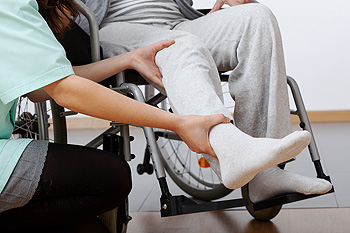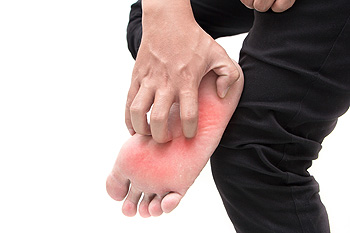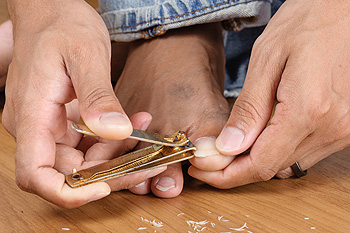December 2018
Is Foot Therapy Effective?
 Many people have experienced foot and ankle injuries and may be familiar with physical therapy as a form of positive foot therapy. It may contribute in providing the desired relief, which may be needed from uncomfortable foot conditions that may include plantar fasciitis or foot and ankle fractures. This type of therapy may be conducive in restoring joint mobility, much needed muscle strength, in addition to improvements in walking. These types of injuries may originate from overuse of the muscles and tendons in the feet and ankles. Additionally, foot therapy may be useful in recovering from foot or ankle surgery. If you have endured a serious injury to your foot, ankle, or surrounding areas, it is advised to seek the counsel of a podiatrist who can recommend the best form of therapy for you.
Many people have experienced foot and ankle injuries and may be familiar with physical therapy as a form of positive foot therapy. It may contribute in providing the desired relief, which may be needed from uncomfortable foot conditions that may include plantar fasciitis or foot and ankle fractures. This type of therapy may be conducive in restoring joint mobility, much needed muscle strength, in addition to improvements in walking. These types of injuries may originate from overuse of the muscles and tendons in the feet and ankles. Additionally, foot therapy may be useful in recovering from foot or ankle surgery. If you have endured a serious injury to your foot, ankle, or surrounding areas, it is advised to seek the counsel of a podiatrist who can recommend the best form of therapy for you.
Foot therapy is often necessary for those recovering from either foot deformities or foot injuries. If you have concerns regarding therapy, Dr. Scott Shrem of Garden State Foot & Ankle Center. Our doctor can provide the care you need to keep you pain-free and on your feet.
Most Common Injuries
People who are active or athletes are prone to a variety of injuries. Therefore, it is often important to take part in physical therapy in order to quickly get back on the right track.
What to Do When Injured
Physical Therapy – This specialized treatment will focus on the affected area, speeding up recovery and the overall healing process. It is a proven method that has helped millions of people return from any injury.
During physical therapy you will undergo regimented training to get back into full form. Training is often very difficult, especially at first when the foot feels weak. Physical therapy often involves:
Basic stretching and twisting exercises – getting the feet’s mobility and flexibility up.
Massaging – the therapist will massage the injured area in order to activate the muscles and relax them.
Strengthening Exercises – this allows the muscles in the affected area to regain their full strength, a vital step towards full recovery.
If you have any questions please feel free to contact our office located in Hazlet, NJ . We offer the newest diagnostic tools and technology to treat your foot and ankle needs.
Athlete's Foot Is Contagious
 The medical name for Athlete’s foot is referred to as tinea pedis. This common fungal infection that attacks the skin on the feet may typically affect a large percentage of people who will develop this at some point in their lives. This fungus can enter the body through tiny cracks in the skin. It is generally found in public pools and surrounding areas, locker rooms, or contaminated surfaces. Patients who experience this contagious skin condition may often notice itchy and red skin between the toes or on the sole of the foot, blisters, or in severe cases, cracked skin may develop. There may be several ways to prevent this condition from developing, including washing and drying the feet regularly, avoiding the sharing of shoes and towels, and failing to alternate shoes. If you feel you have Athlete’s foot, it is suggested to speak to a podiatrist who can offer proper treatment options for you.
The medical name for Athlete’s foot is referred to as tinea pedis. This common fungal infection that attacks the skin on the feet may typically affect a large percentage of people who will develop this at some point in their lives. This fungus can enter the body through tiny cracks in the skin. It is generally found in public pools and surrounding areas, locker rooms, or contaminated surfaces. Patients who experience this contagious skin condition may often notice itchy and red skin between the toes or on the sole of the foot, blisters, or in severe cases, cracked skin may develop. There may be several ways to prevent this condition from developing, including washing and drying the feet regularly, avoiding the sharing of shoes and towels, and failing to alternate shoes. If you feel you have Athlete’s foot, it is suggested to speak to a podiatrist who can offer proper treatment options for you.
Athlete’s foot is an inconvenient condition that can be easily reduced with the proper treatment. If you have any concerns about your feet and ankles, contact Dr. Scott Shrem from Garden State Foot & Ankle Center. Our doctor will treat your foot and ankle needs.
Athlete’s Foot: The Sole Story
Athlete's foot, also known as tinea pedis, can be an extremely contagious foot infection. It is commonly contracted in public changing areas and bathrooms, dormitory style living quarters, around locker rooms and public swimming pools, or anywhere your feet often come into contact with other people.
Solutions to Combat Athlete’s Foot
- Hydrate your feet by using lotion
- Exfoliate
- Buff off nails
- Use of anti-fungal products
- Examine your feet and visit your doctor if any suspicious blisters or cuts develop
Athlete’s foot can cause many irritating symptoms such as dry and flaking skin, itching, and redness. Some more severe symptoms can include bleeding and cracked skin, intense itching and burning, and even pain when walking. In the worst cases, Athlete’s foot can cause blistering as well. Speak to your podiatrist for a better understanding of the different causes of Athlete’s foot, as well as help in determining which treatment options are best for you.
If you have any questions please feel free to contact our office located in Hazlet, NJ . We offer the newest diagnostic and treatment technologies for all your foot and ankle needs.
Simple Steps to Implement Proper Foot Care
 The importance of implementing daily foot care may be crucial to the overall health of the body. It may be easy to overlook the simple care the feet desire when poorly fitting shoes are worn, in addition to the feet possibly being enveloped in tight and sweaty socks for most of the day. The feet endure the weight from the entire body and may become injured as a result of the impact from daily walking. Research has shown the feet will generally feel better when they are washed and dried daily, followed by utilizing a good moisturizer, especially in the winter months. Shoes that are chosen should feel comfortable when they are initially tried on and shoes that do not have adequate arch support should be avoided. Additionally, there are conditions that may affect your feet, including diabetes, pregnancy, and the aging process and it is beneficial to consult with a podiatrist to discuss the changes in foot structure that may occur.
The importance of implementing daily foot care may be crucial to the overall health of the body. It may be easy to overlook the simple care the feet desire when poorly fitting shoes are worn, in addition to the feet possibly being enveloped in tight and sweaty socks for most of the day. The feet endure the weight from the entire body and may become injured as a result of the impact from daily walking. Research has shown the feet will generally feel better when they are washed and dried daily, followed by utilizing a good moisturizer, especially in the winter months. Shoes that are chosen should feel comfortable when they are initially tried on and shoes that do not have adequate arch support should be avoided. Additionally, there are conditions that may affect your feet, including diabetes, pregnancy, and the aging process and it is beneficial to consult with a podiatrist to discuss the changes in foot structure that may occur.
Everyday foot care is very important to prevent infection and other foot ailments. If you need your feet checked, contact Dr. Scott Shrem from Garden State Foot & Ankle Center. Our doctor can provide the care you need to keep you pain-free and on your feet.
Everyday Foot Care
Often, people take care of their bodies, face and hair more so than they do for their feet. But the feet are a very important aspect of our bodies, and one that we should pay more attention to. Without our feet, we would not be able to perform most daily tasks.
It is best to check your feet regularly to make sure there are no new bruises or cuts that you may not have noticed before. For dry feet, moisturizer can easily be a remedy and can be applied as often as necessary to the affected areas. Wearing shoes that fit well can also help you maintain good foot health, as well as making it easier to walk and do daily activities without the stress or pain of ill-fitting shoes, high heels, or even flip flops. Wearing clean socks with closed shoes is important to ensure that sweat and bacteria do not accumulate within the shoe. Clean socks help to prevent Athlete’s foot, fungi problems, bad odors, and can absorb sweat.
If you have any questions please feel free to contact our office located in Hazlet, NJ . We offer the newest diagnostic and treatment technologies for all your foot and ankle needs.
Are Plantar Warts Contagious?
 A painful and uncomfortable condition that is known as plantar warts will typically affect the heel of the foot. It appears as a small, thickened area with tiny black dots in the center, and may generally cause severe pain while walking. Most warts extend outward from the skin, but this wart grows inward as a result of the pressure the heel endures from walking for most of the day. Plantar warts are known to be caused by the human papillomavirus (HPV) and is extremely contagious. This type of virus thrives in warm and moist places, often including pools, locker rooms, and surrounding areas. Research has shown that it may enter the body through tiny cracks in the skin of the heel area. Measures can be implemented that may prevent this virus from attacking the body, which may include wearing appropriate shoes in public shower areas, and avoid sharing towels, shoes, or socks. If you feel you have developed this ailment, it is suggested to speak with a podiatrist to discuss proper treatment options.
A painful and uncomfortable condition that is known as plantar warts will typically affect the heel of the foot. It appears as a small, thickened area with tiny black dots in the center, and may generally cause severe pain while walking. Most warts extend outward from the skin, but this wart grows inward as a result of the pressure the heel endures from walking for most of the day. Plantar warts are known to be caused by the human papillomavirus (HPV) and is extremely contagious. This type of virus thrives in warm and moist places, often including pools, locker rooms, and surrounding areas. Research has shown that it may enter the body through tiny cracks in the skin of the heel area. Measures can be implemented that may prevent this virus from attacking the body, which may include wearing appropriate shoes in public shower areas, and avoid sharing towels, shoes, or socks. If you feel you have developed this ailment, it is suggested to speak with a podiatrist to discuss proper treatment options.
Plantar warts can be very uncomfortable. If you need your feet checked, contact Dr. Scott Shrem from Garden State Foot & Ankle Center. Our doctor will assist you with all of your foot and ankle needs.
About Plantar Warts
Plantar warts are the result of HPV, or human papillomavirus, getting into open wounds on the feet. They are mostly found on the heels or balls of the feet.
While plantar warts are generally harmless, those experiencing excessive pain or those suffering from diabetes or a compromised immune system require immediate medical care. Plantar warts are easily diagnosed, usually through scraping off a bit of rough skin or by getting a biopsy.
Symptoms
- Lesions on the bottom of your feet, usually rough and grainy
- Hard or thick callused spots
- Wart seeds, which are small clotted blood vessels that look like little black spots
- Pain, discomfort, or tenderness of your feet when walking or standing
Treatment
- Freezing
- Electric tool removal
- Laser Treatment
- Topical Creams (prescription only)
- Over-the-counter medications
To help prevent developing plantar warts, avoid walking barefoot over abrasive surfaces that can cause cuts or wounds for HPV to get into. Avoiding direct contact with other warts, as well as not picking or rubbing existing warts, can help prevent the further spread of plantar warts. However, if you think you have developed plantar warts, speak to your podiatrist. He or she can diagnose the warts on your feet and recommend the appropriate treatment options.
If you have any questions please feel free to contact our office located in Hazlet, NJ . We offer the newest diagnostic and treatment technologies for all your foot and ankle needs.
Blog Archives
- April 2025
- March 2025
- February 2025
- January 2025
- December 2024
- November 2024
- October 2024
- September 2024
- August 2024
- July 2024
- June 2024
- May 2024
- April 2024
- March 2024
- February 2024
- January 2024
- December 2023
- November 2023
- October 2023
- September 2023
- August 2023
- July 2023
- June 2023
- May 2023
- April 2023
- March 2023
- February 2023
- January 2023
- December 2022
- November 2022
- October 2022
- September 2022
- August 2022
- July 2022
- June 2022
- May 2022
- April 2022
- March 2022
- February 2022
- January 2022
- December 2021
- November 2021
- October 2021
- September 2021
- August 2021
- July 2021
- June 2021
- May 2021
- April 2021
- March 2021
- February 2021
- January 2021
- December 2020
- November 2020
- October 2020
- September 2020
- August 2020
- July 2020
- June 2020
- May 2020
- April 2020
- March 2020
- February 2020
- January 2020
- December 2019
- November 2019
- October 2019
- September 2019
- August 2019
- July 2019
- June 2019
- May 2019
- April 2019
- March 2019
- February 2019
- January 2019
- December 2018
- November 2018
- October 2018
- September 2018
- August 2018
- July 2018
- June 2018
- May 2018
- April 2018
- March 2018








